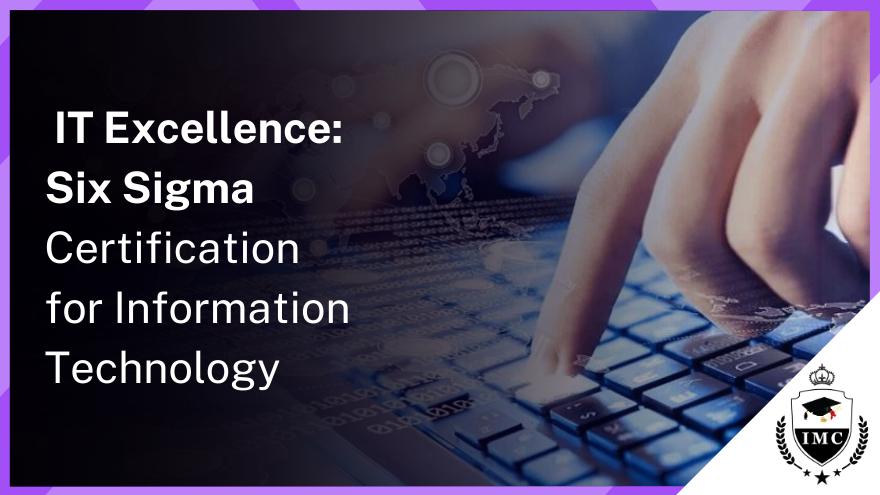The Six Sigma Lean Black Belt in IT, offered by IMC Institute, provides a strong foundation in Lean Six Sigma principles within the IT industry. It focuses on how IT contributes to an organization's success during Six Sigma implementation. Many major IT departments aim to streamline operations, and Six Sigma offers a precise approach to showcase technology's value while reducing costs. In the fast-paced realm of Information Technology (IT), where efficiency and quality are paramount, embracing methodologies that drive process improvement becomes crucial. This is where a Lean Six Sigma Certification in Information Technology emerges as a game-changer. In this blog post, we delve into the significance of Six Sigma in the IT landscape and explore the top reasons why professionals are increasingly opting for this certification.
Understanding Six Sigma in Information Technology
Defining Six Sigma in IT
Six Sigma is a methodology rooted in statistical tools and concepts, designed to identify and eliminate variations or defects in a process. An Accredited Six Sigma Certification in Information Technology signifies an individual's mastery in applying this methodology, making them a valuable asset across industries.
Importance of Process Improvement
In the IT sector, process improvement is not just desirable; it's vital. From product development to maintenance, Six Sigma is seamlessly integrated into core processes. The methodology proves instrumental in eliminating errors during the product development phase, ensuring that end products meet client needs and requirements seamlessly.
Top 10 Reasons for Pursuing Lean Six Sigma Certification in Information Technology
Process Efficiency:
Lean Six Sigma Certification helps individuals in IT understand and implement methodologies that enhance process efficiency. This is crucial in an industry where streamlined processes, especially in product development and maintenance, can significantly reduce costs and improve overall productivity.
Error Reduction:
In the IT sector, errors and bugs can be costly and time-consuming. Lean Six Sigma equips professionals with tools to identify and eliminate errors during the development process, ensuring that the final product meets client needs and requirements without unnecessary delays or rework.
Problem Resolution Standardization:
Standardizing the resolution of hardware or software issues is paramount in IT. Lean Six Sigma training enables employees to document and standardize fixes, ensuring that troubleshooting time is minimized. This consistency is particularly valuable in an industry where quick problem resolution is essential.
Quality Customer Support:
Providing quality support is essential in IT, even when dealing with internal customers. Lean Six Sigma training emphasizes understanding customer needs, courteous behavior, and timely responses. This approach not only enhances the internal support process but also contributes to overall customer satisfaction.
Comprehensive Employee Training:
Lean Six Sigma is beneficial for training employees at all levels within an IT organization. From entry-level positions to management roles, the training provides a common framework for understanding process improvement, quality support, and meeting customer needs. This comprehensive approach contributes to a cohesive and efficient IT team.
Enhanced Documentation:
Lean Six Sigma emphasizes the importance of documenting processes and improvements. In IT, detailed documentation of fixes, repairs, and processes is invaluable for maintaining equipment, minimizing downtime, and ensuring that everyone in the organization can contribute to efficient problem resolution.
Reduced Product Redevelopment:
Successful deployment of Six Sigma in IT often leads to reduced product redevelopment. The use of tools like Failure Mode and Effects Analysis (FMEA) helps identify potential errors before product delivery, reducing the need for redevelopment and, consequently, improving customer satisfaction.
Customer Satisfaction Improvement:
Lean Six Sigma in IT involves techniques like FMEA, which proactively identify and address potential issues. This results in improved product quality and, subsequently, increased customer satisfaction. Satisfied customers are crucial for the success and reputation of IT companies.
Leadership Development Opportunities:
Individuals with LeanSix Sigma Certification are often viewed as valuable assets within an organization. Their ability to make a significant impact on processes and outcomes opens up leadership opportunities, allowing them to play a pivotal role in guiding and shaping the organization.
Salary Advancement:
Lean Six Sigma Certification not only opens up leadership opportunities but also enhances earning potential. Employers recognize the value of employees who can drive process improvements and boost overall efficiency. As a result, Lean Six Sigma Certified professionals often enjoy higher salaries and increased recognition for their contributions.
Job Opportunities with Lean Six Sigma Certification in Information Technology
In today's competitive job market, an Accredited Lean Six Sigma Certification is a powerful asset. Organizations globally are adopting Six Sigma to enhance performance and reduce defects, making certified professionals highly sought after. The certifications offered by IMC Institute have attracted major players in Information Technology, including Google, IBM, Dell, Cisco, Intel, Oracle, and Accenture.
Overview of Lean Six Sigma Certifications in Information Technology
IMC Institute offers a range of Six Sigma Certification and Lean Six Sigma Certification in Information Technology courses. From White Belt to Master Black Belt programs, our accredited training ensures customized learning at every level, fostering team unity and individual value within the organization.
Lean Six Sigma Certification Levels:
- Green Belt Training & Certification in Information Technology Program: Ideal for direct participation in Six Sigma projects, enhancing problem-solving skills, and applying statistical methods for process improvement.
- Black Belt Training & Certification: in Information Technology Program: For those leading Six Sigma efforts within organizations, exhibiting leadership qualities, and understanding team dynamics.
- Master Black Belt Training & Certification: in Information Technology Program: An advanced level program requiring successful completion of the Black Belt Certification and additional project requirements.
Choose Excellence with IMC Institute
At IMC Institute we take pride in providing top-notch education and certifications that stand the test of time. Our commitment to excellence, global recognition, and certifications without expiration dates make us the preferred choice for individuals and organizations seeking quality education in Information Technology. Visit IMC Institute today to explore our comprehensive offerings and embark on a journey towards excellence with our Six Sigma Certification programs. Stand out in the competitive IT landscape with skills that make a lasting impact. Choose IMC Institute - Where Quality Education Meets Global Recognition.






